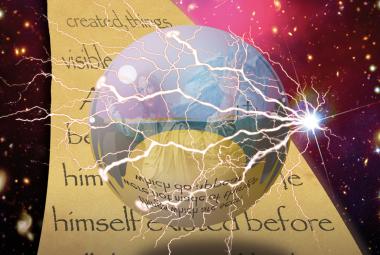Is our universe expanding or static? If it is expanding, is there sufficient mass to cause it all to collapse back in upon itself under gravity's influence? If the universe is static and not now expanding, is it stable?
What holds it all together-if anything?
These are questions gaining more attention these days as our knowledge data base in astronomy and astrophysics increases, and old theories are brought into question. There is much that can be said about these questions from the Biblical revelation.
New Testament References
Several separate passages in the New Testament make reference to the creation of the universe. For example, John's gospel speaks of an earlier state of existence than is described in Verse 1 of Genesis:
"In the beginning was the Word, [logos] and the Word was with God, and the Word was God. He was in the beginning with God; [i.e., before creation] all things were made through him, and without him was not anything made that was made." John 1:1-3
This passage teaches that Jesus was eternally existent with God the Father prior to the creation of "all things." There was a time when our material and spiritual universe did not exist. It had a definite beginning. But before that, God was. In fact, God is-because time itself was created by God.
Chapter One of Paul's Epistle to the Colossians gives a further description of the role of Jesus in creation, consistent with that of John's gospel:
[Jesus] is the image of the invisible God, the first-born [prototokos] of all creation; for in him all things were created, in heaven and on earth, visible and invisible, whether thrones or dominions or principalities or authorities [these words in Greek refer to the hierarchical angelic powers]-all things were created through him and for him. He is before all things, and in him all things hold together. Colossians 1:15-17
The Holy Spirit, in giving us this inspired passage of Scripture, explains that all things (both visible and invisible) in the entire universe were created through this same Jesus, the eternal Word. We may think of the universe and its intricate design as being conceived in the mind of the Father, then spoken into existence by the Son (who makes the invisible, visible). The Holy Spirit is the One who energizes and supplies life to the creation, not only at the time of creation but also moment by moment after that.
We are also told that all things were created for Jesus. He is "the heir of all things." That means that we are house guests in Someone Else's universe! This implies a future accountability for all of us-history is headed somewhere-at the end of the road stands Jesus, to whom all power and authority has already been given (see John 5:22-29).
A. W. Tozer, Pastor at Moody Bible Church in Chicago some 50 years ago, once wrote of this as follows:
The teaching of the New Testament is that now, at this very moment, there is a Man in heaven appearing in the presence of God for us. He is as certainly a man as was Adam or Moses or Paul; he is a man glorified, but his glorification did not de-humanize him. Today he is a real man, of the race of mankind, bearing our lineaments and dimensions, a visible and audible man, whom any other man would recognize instantly as one of us.
But more than this, he is the heir of all things, Lord of all lords, head of the church, firstborn of the new creation. He is the way to God, the life of the believer, the hope of Israel, and the high priest of every true worshiper. He holds the keys of death and hell, and stands as advocate and surety for everyone who believes on him in truth. Salvation comes not by accepting the finished work, or deciding for Christ; it comes by believing on the Lord Jesus Christ, the whole, living, victorious Lord who, as God and man, fought our fight and won it, accepted our debt as his own and paid it, took our sins and died under them, and rose again to set us free. This is the true Christ; nothing less will do.
All Things "Hold Together"
One of the key words in the Colossians passage above ("...and in Christ all things hold together") is the Greek word sunistemi which means "to stand-together," "to be compacted together," "to cohere," "to be constituted with."
This passage can be applied to the structure of the atom, for example. The nucleus of every atom is held together by what physicists call "weak" and "strong" forces.
[Physicists today are familiar with four basic forces in the natural world: gravity and electrical forces, plus a "strong" and a "weak" nuclear force. The first two forces decrease in strength inversely with the square of the distance between two objects; the latter two forces act only at very short ranges.]
The nucleus of the atom contains positively charged and neutral particles-to use a simplistic model. Mutual electrostatic repulsion between the like-positive protons would drive the nucleus apart if it were not for the "strong force" which binds the nucleus together.
There is thus an active force imposed on the universe, which actively holds the very atoms of the material world together moment by moment, day by day, century by century.
Similarly, accelerated electrons circling the nucleus should quickly radiate all their energy away and fall into the nucleus unless there exists an invisible energy source to counteract this.
The third New Testament creation-related passage which talks about atomic structure and physics is found in the Apostle Peter's Second Epistle:
But the day of the Lord will come like a thief, and then the heavens will pass away with a loud noise [rhoizedon, a rushing roar] and the elements [stoicheion, atoms] will be dissolved with fire and the earth and the works that are upon it will be burned up. 2 Peter 3:10 The Greek word translated "elements" in the above mentioned passage from Colossians (and in 2 Peter also) is stoicheion, which can mean "the building blocks of the universe," or "the ordered arrangement of things." It can also mean the "atomic elements." The word translated "dissolved" in 2 Peter 3:10 is literally (in Greek) luo, meaning "unloosed." This language suggests that there will come a time in the future when God lets go of the nuclear forces which hold the atom together. This passage, like the one in Colossians, strongly suggests that the active power of God is behind the mysterious strong force that holds every atomic nucleus together. If this is so, all the other fundamental forces of nature are likewise forces that originate with Christ and His sustaining direction of the old creation.
Sustaining the Universe
If God "sustains the universe by His mighty word of power," moment by moment, were He to merely relax His grasp on the universe, every atom would come apart "by fire" (that is, by nuclear fire). It is inescapable that the Bible claims that God dynamically sustains the universe, including the very atoms themselves. Atoms, it would seem, are "stable" only because force and energy are being supplied into their physical nuclear binding fields from "outside" the system.
Whatever we may think of God and physics, the Bible leaves us with no room to doubt that God does care about the sparrow that falls to the ground, the widow, the orphan, and the homeless. He does not lose track of His children and watches over them with infinite, patient, intimate Fatherly care. Not only does He sustain the universe by His mighty word of power, God also alters the status quo from time to time and, in response to prayer, frequently changes the course of entire nations. In a future day his intrusive reinterven-tion will be very radical indeed.
Another important claim of Scripture about the old creation is that God is the present Sustainer of the universe. That is, He is not uninvolved, remote, detached and impersonal-leaving things to run by themselves by any means.
Among secular scientists today there are many who acknowledge that God exists. But He is usually considered as only a First Cause-the One who brought the universe into existence and set it into motion. But most of these same scientists assume God was not involved after the initial act of creation.
This is contrary to clear statements in the Bible that God is very much involved in every event that takes place in the ongoing history of the entire universe. Causality links everything together, because God "works (Gr: energizes) all things according to the counsel of His will." (Ephesians 1:11.)
The opening verses of the Letter to the Hebrews give us another New Testament picture of God's role in the creation:
[But] in the last of these days He has spoken to us in [the person of a] Son, Whom He appointed Heir and lawful Owner of all things, also by and through Whom He created the worlds and the reaches of space and the ages of time-[that is] [He made, produced, built, operated, and arranged them in order]. He is the sole expression of the glory of God-[the Light-being, the out-raying or radiance of the divine],-and He is the perfect imprint and very image of [God's] nature, upholding and maintaining and guiding and propelling the universe by His mighty word of power..." Hebrews 1:2-3 (Amplified Bible)
A fifth great New Testament passage concerning Jesus and His place in creation is found in Revelation Chapter 1:
"I am the Alpha and the Omega," says the Lord God, who is and who was and who is to come, the Almighty. I John, your brother, who share with you in Jesus the tribulation and the kingdom and the patient endurance, was on the island called Patmos on account of the word of God and the testimony of Jesus. I was in the Spirit on the Lord's day, and I heard behind me a loud voice like a trumpet... When I saw him, I fell at his feet as though dead. But he laid his right hand upon me, saying, "Fear not, I am the first and the last, and the living one; I died, and behold I am alive for evermore, and I have the keys of Death and Hades." Revelation 1:8-10,17-18
Here Jesus is called "the Alpha and Omega," "the First and the Last." Not only is Jesus the Son of God to be found at the beginning of history, He also stands at the end of history and at the end of every life. He is the Judge of all, and He is the heir of all things.
Science and the Bible
Truth from science must in the long run agree with Biblical revelation-if the Bible is true. If the Bible "says what it means and means what it says" (to quote Chuck Missler) then it is Jesus who holds the universe in his hands just as the old American folk spiritual says.
Our moment-by-moment existence depends on His gracious sustenance of every electron, every atom, every molecule and every spiritual entity as well. We are safe when we place our trust in Him and put our whole lives into His hands! Can we not then stand in awe of our great God and Creator, along with the Psalmist who wrote:
"O come, let us sing to the LORD; let us make a joyful noise to the rock of our salvation! Let us come into his presence with thanksgiving; let us make a joyful noise to him with songs of praise! For the LORD is a great God, and a great King above all gods. In his hand are the depths of the earth; the heights of the mountains are his also. The sea is his, for he made it; for his hands formed the dry land. O come, let us worship and bow down, let us kneel before the LORD, our Maker! For he is our God, and we are the people of his pasture, and the sheep of his hand. O that today you would hearken to his voice!" Psalm 95:1-7
Next month, God willing, we'll look further at this subject in a discussion of theories of the vacuum, and the interaction between the material creation and the invisible, intangible (but very real) spiritual world which God has also created around us and within which the material world is embedded.






